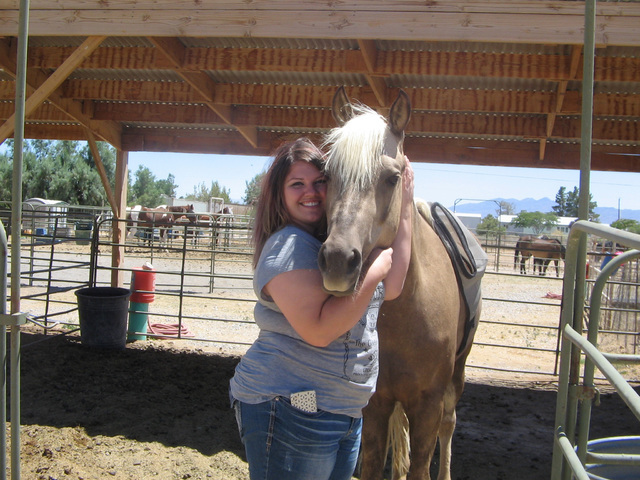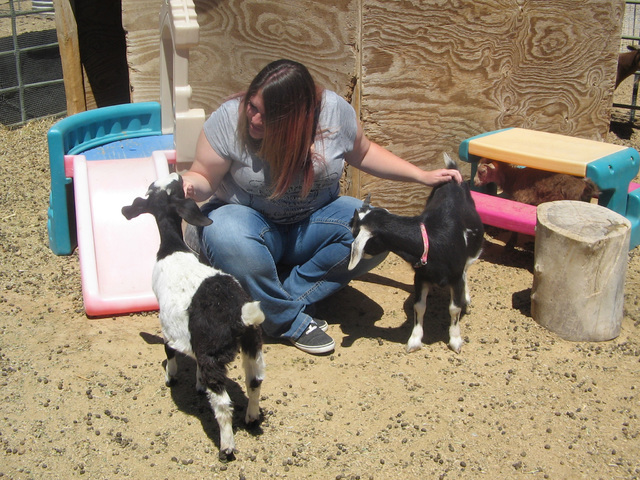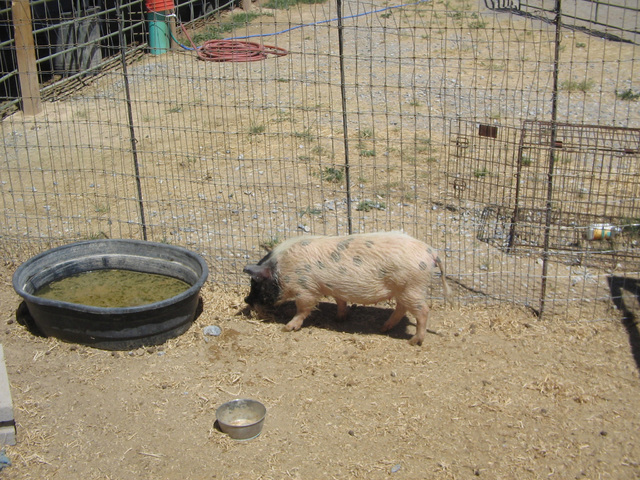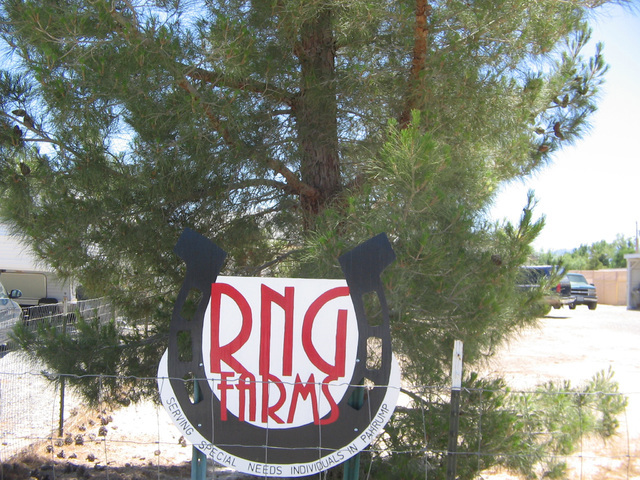RNG Farms focuses on therapy and emotional support with animals
Winston S. Churchill said, “There is something about the outside of a horse that is good for the inside of man.”
Erica Johnston and others trained to work in equine-assisted therapy programs can certainly relate to that statement.
Johnston is the owner/manager and program instructor at RNG Farms, which she started on the family farm in Pahrump in 2013.
The 24-year-old became a certified instructor of riders with disabilities through the Certified Horsemanship Association after extensive training at a clinic in Las Vegas and the completion of written exams. She is also certified as an equine massage practitioner.
Johnston is empathetic with individuals having special needs since she has some family members who have autism and cerebral palsy. She offers traditional Western or English riding lessons, but her passion is working with special needs individuals of all ages.
“We have people with cerebral palsy. When you have that, it will actually be the movement of the horse that will help loosen up their muscles,” Johnston said. “When you have autism, if they have sensory processing, it kind of helps with that, it helps balance them out some.”
She added that the program can help individuals with behavior issues since horses can have a calming effect.
Therapeutic horse riding can also help anxiety and depression.
“I’ve known people that have had depression and the horses have actually pulled them out of it; like really, really bad depression, anxiety and OCD (obsessive-compulsive disorder),” she said.
All her horses are carefully screened, trained and desensitized to things around them prior to being used in the program.
Gadget is a 5-year-old, soon-to-be therapy horse after Johnston desensitizes him by having balls thrown toward him, over him, and around him.
“This horse is so amazing, he really is,” Johnston said. “I can do pretty much anything to him, and he just does not care.”
There are about 130 animals on the farm including the horses, chickens, ducks, goats and pigs, all which have roles in the animal therapy program.
Johnston said it depends on the diagnosis since she works with all ages, disabilities and special needs, including Down syndrome, fetal alcohol syndrome and attention deficit disorder. A horse could be too big and scary for some children.
“I have one kid who doesn’t like to ride the horse, he likes to go feed the chickens,” she said. “It’s awesome, I love it.”
Johnston said the kids go pick out an animal to interact with, adding that the goats and pigs are usually the most popular, including Char, a young miniature pot-bellied pig registered as an emotional support animal.
She has hosted holiday parties and special events for the public at the farm, including the first annual Family Fun Day in June. Her petting zoos have also been popular at community events such as Pumpkin Days in October sponsored by the Pahrump Disability Outreach Program (PDOP).
Johnston’s program includes about 30 clients in Pahrump and some in Las Vegas and continues to grow. She offers a reasonable fee schedule for families and individuals since the program is not covered by insurance. She would like to get more students and volunteers for her activities.
She gets help from family members, especially her parents, Lynne and Danny Johnston.
“She’s dedicated, loves what she does, and she works hard at it,” Danny Johnston said. “We’re very proud of her.”
The Southern Nevada Counseling Center in Pahrump contracts with RNG Farms for use of the horses and arena for EAGALA therapy. That is an acronym for the Equine Assisted Growth And Learning Association.
Nell Lobdell, case manager/equine specialist at the center, explained that the EAGALA model uses a team approach with a licensed mental health professional, an equine specialist, horses of course, and the client in psychotherapy. It is different from a traditional therapy session, one-on-one with a therapist and client in a room.
“Unlike what Erica does, we focus on human skills, not horse skills, Lobdell said. “Yes, they’re there with the horse and the equine specialist on a ranch, but we’re focusing on the human developing skills, not the horse skills.”
Lobdell said everything is done on the ground with the horses. Sometimes a child or client is rewarded with a horseback ride for their progress in their treatment plan, even though they do not focus on riding a horse.
A lot can be done with a horse on the ground, such as moving it from one end of the therapy arena to another.
A client may choose to use a horse as part of a treatment plan to show, for example, how they want to get along with kids in school. They can choose to stroke the horse, chase it, or put it in a structure, Lobdell explained.
“A lot of it is observing their (client’s) behavior, and how the horses react to them, it’s as simple as that,” she said.
The model is solution-oriented, each client has the solution to their problems within themselves, and they work through their issues with the horses, the therapist and the equine specialist to resolve them.
Lobdell described the EAGALA model as amazing and powerful; the horses pick up on verbal and non-verbal communication cues with the client, react and respond with the client to help them process their experience in finding a solution to their issue, or behavior.
It can be used for individuals of all ages, couples, families and is effective for anxiety, post-traumatic stress disorder, depression, obsessive-compulsive disorder and a host of other conditions.
Lobdell said she has absolutely seen the positive effects of EAGALA.
“It is now considered a best practice, and that’s the way of mental health, the future of mental health, everything that you do with a client has to have been researched and proven to be a best practice,” she said. “And EAGALA just achieved that level.”
For more information on Erica Johnston’s therapeutic riding program offered at 1911 W. McMurray Drive, email her at RNG.Farms@gmail.com or call 702-427-8096. RNG Farms is also on Facebook.
To learn more about EAGALA, contact the Southern Nevada Counseling Center, 1440 E. Calvada Blvd., Suite 900 or call 775-727-4000.




















